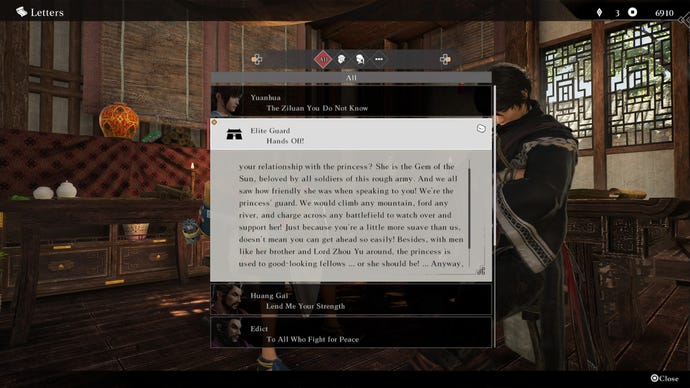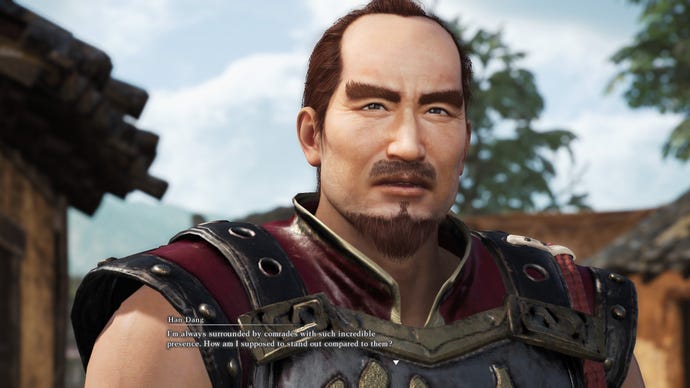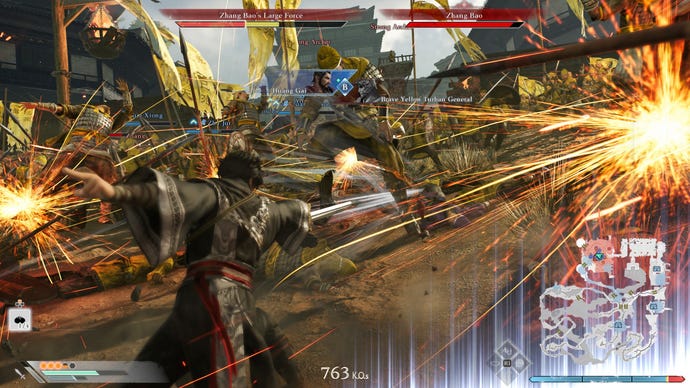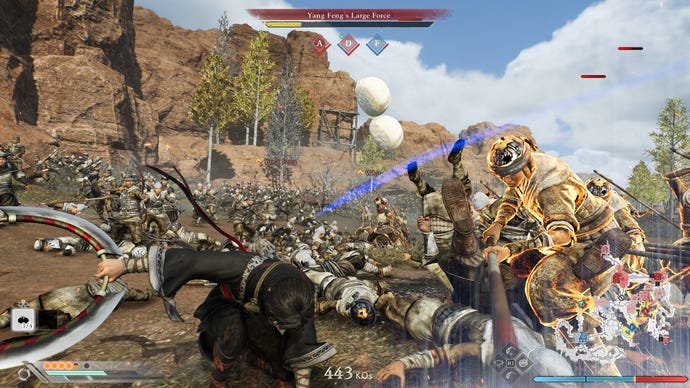Dynasty Warriors: Origins. Finally, a game brave enough to ask: “what if everything cool that went down in Romance Of The Three Kingdoms was thanks to you, a magical, beautiful boy that no-one’s ever heard of?”.
It’s a great premise, honestly. The slate wiped clean, what if you got to be mates with everyone from all sides in this grand ensemble tale of warring states? A battle might take eight minutes. The three consecutive bonding cutscenes before the next might take ten. Origins is just as much about fighting thousands at a time as it is about eating lunch with Zhang Fei or discussing the meaning of heroism with Zhou Yu. There’s a parallel story about your character and his role in a magical order of destiny godlings I didn’t find the least bit interesting, but the rest is thrilling because Romance is already thrilling. The parts that Origins bogs down with its wordier take on already wordy source material are enlivened again by anime vibrance, hijinks, and melodrama.
Each time you knock out one thousand men in battle (the ‘K.O count’ conceit remains, your sharp sword the size of a horse’s hind leg supposedly cleaving through abdomens with as much lasting damage as an Acme anvil) a companion will declare you “a true warrior of the Three Kingdoms”. It’s an energy that persists throughout. The tempests of change bring with them flaming arrows to fell emperors and fracture borders, but everyone still has all the time in the world to gas you up at any opportunity. You’re so courageous, bro. I’m not sure whether to value compassion or strength or tactics but you get it, bro.
I love it. Soft series reboots like Origins usually identify the core of something’s identity then work to strip back the cruft. ‘Musou’ translates from Japanese to something like “peerless” or “the only one”. Origins is actually most successful when it plays with this idea, but it also never holds back in letting you know how special you are. Here’s a letter that made me laugh:

You get a lot of letters. They help lend personality to the unnamed thousands fighting alongside you. You didn’t know you’d actually saved a conscripted farmer’s life while you were getting knocked off a ladder and chasing down some dude called “Brave General” as he pushed aside his men to get away from your whirling twin axes, but you did. The letters often contain gifts, too. I don’t know how that farmer managed to afford this magic defense amulet, but I’m grateful.
Battles are about cadence. Abridged fighting game parry-and-combo rhythms. Rock opera swells and lulls. The hanging note threatening a crushing enemy tactic in two minutes if you can’t meet an objective in time. Defeat the character signalling for the charge. Defeat enough archers to prevent a volley. The minor victory of a captured camp cementing your hold on the western flank. The bitter final exhalation of a favourite general of tertiary importance, resigned to retreat because you were too tied up shadowing mission-critical Liu Bei.
You learn to make sacrifices. I’ve spent time shooting breeze with these brave generals so it always hurts by proxy in a “I don’t truly care but I think my character might” sort of way. Zhang Fei did buy me a very large beef bowl, so I suppose I owe him. Unless it’s Han Dang. He’s a Sun family general, all male pattern baldness and comically low self-esteem. He means everything to me.
You will never get a failure condition related to Han Dang, and maybe that’s why I made my own. I would mount my horse and pelt it from one side of the map to the other if I got a whiff this man was about to retreat. You’ll get notified: Han Dang is facing tough fight. His health bar turns yellow to signal danger but gets restored if you gallop up to his side in time. It makes for two or three brilliant “I was wondering when you might show up” movie moments in each battle. Sometimes I’d enter promising I’d make sure none of my generals had to retreat, only to later be forced to accept that even the most magical, beautiful boy that ever lived can’t be everywhere.

Can’t be everywhere, and can’t do everything. And so the musou, army-of-one concept is perhaps examined, maybe refuted, definitely played with. I’m not confident enough to say the Dynasty Warriors formula was getting stale, but that’s only because it might’ve gotten less so since I last stopped playing Dynasty Warriors games (they were getting stale). I won a few battles by rushing in to cut the head off the snake, but only a few. It’s usually a terrible idea. As you take more camps, kill more officers, and carve out space for your side to advance, you’ll lower your foe’s morale and courage. Motivated armies mean stronger, more aggressive characters and deadlier retinues with more frequent tactical maneuvers. Plus there’s also just a much higher chance the rest of your army will get crushed if you’re off playing hero. ‘Tactics’ is pushing it, but it’s definitely about being part of something bigger than yourself.
I take time to appreciate the sweeping draw distance. Thumping, muddy horse hooves. Fire arrows screaming defiantly in the rain. I pause to take stock. Do I have time for a solo base run to push our lines forward? Does someone need help? I go to unpause, but it takes me a moment. When you pause, all the channels but lead and rhythm guitar are silenced. I am convinced nobody has shredded this hard since records began. The electric pickup was not invented in the 1900’s – it fell from the sky above Hebei during the Yellow Turban Rebellion and buried itself in the dirt between arrow hails. The music is exquisite: diegetic in the sense that only its furious, virtuosic energy actually having echoed across these battlefields would explain how regular people could fight this much like gods.

Although, as I said, fighting like a god is discouraged. The line between victory and failure in the later missions is too tight to waste time, and so rampaging through gaggles of infantry to get that K.O count as high as possible becomes a wasteful luxury. Instead, you’ll hop from one general to another, hoping the crowds catch enough stray swings to build up your musou meter. I’m both disappointed and appreciative. The hallowed Dynasty Warriors fuckabout sesh rampage is my strongest association with the series, but I can guess this was also a major source of the fatigue Origins wants to avoid.
So instead you have moments of collaboration. Protecting a fellow general so they can unleash their own tactic. Maybe it results in a huge enemy morale drop, debuffing enemy leaders and letting you sprint from one to the next taking each out with a few decisive strikes. You’ll gather your own retinue as you complete side missions on the gorgeous overworld map, letting you use your own tactics: an arrow volley, or setting a defensive formation in a choke point. You’ll feel it when they aren’t available, when you’ve pushed too deep and left your companions behind.
There are nine weapons in all, gathered from battles or vendors. Most of them feel distinct, but there’s a few that just add a new twist to familiar light-strong attack strings. The chakram’s were a favourite. You can throw a wheel in the air only to have it come spinning down on someone’s head a few moments later. You can spend the interim spinning and catching airborne chakrams, powering them up if you time it correctly. Then there’s the staff that has an infinite spin combo. When I discovered it, I decided it was the best day of my life. Sometimes, it really is just about knocking out a thousand men.

There’s no co-op, but “fun with mates” is always a cop out anyway. Dynasty Warriors Origins is great fun without mates, and you’ll make enough in the game anyway. You’ll often get to pick a companion, switching to them for a few short, absurdly powerful minutes once or twice a battle. The scarcity helps reinforce their legend. Getting to play for hours as Guan Yu is sort of like walking in on him on the toilet after only knowing him from that statue.
Han Dang is not available as a companion, so I never found out what is was like to walk over one thousand knocked-out men in his shoes. Later, I spoke to him as part of an optional companion scene. He told me how happy and content he was to just support his companions from the background. I feel the same, although I still wish he got to experience more lone heroism. I was always excited for him when he’d take down an enemy general without my help. It was a real source of tension throughout. I want to see Han Dang blossom, but things are tough enough out there that I know he’ll need a bit of babysitting along the way. And just like that, I’m excited about the stories happening in one small corner of a huge map in a single battle in a sprawling, non-linear campaign. And just like that, I’m excited about Dynasty Warriors again.
This review is based on a review code provided by the publisher.











Add comment